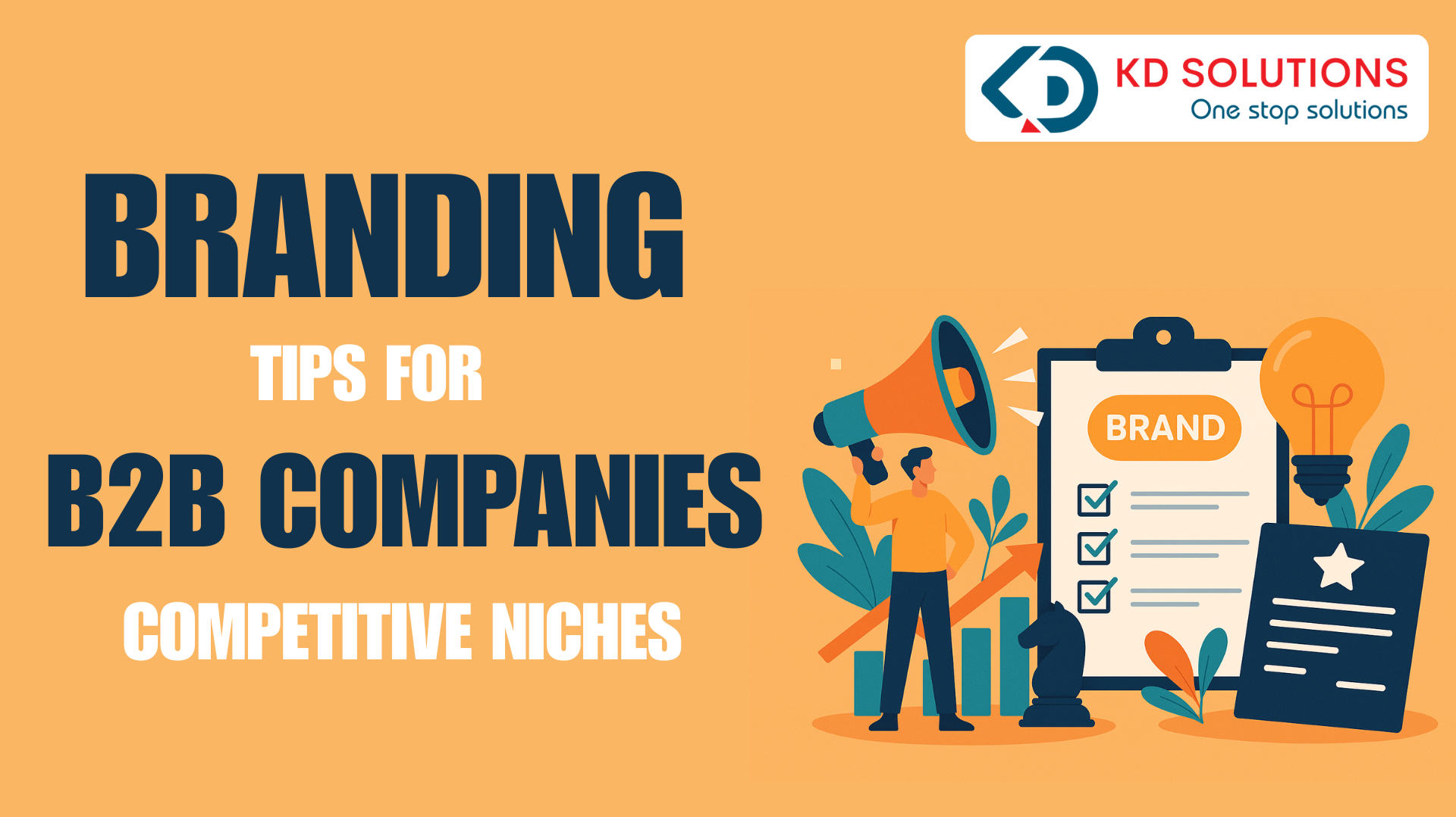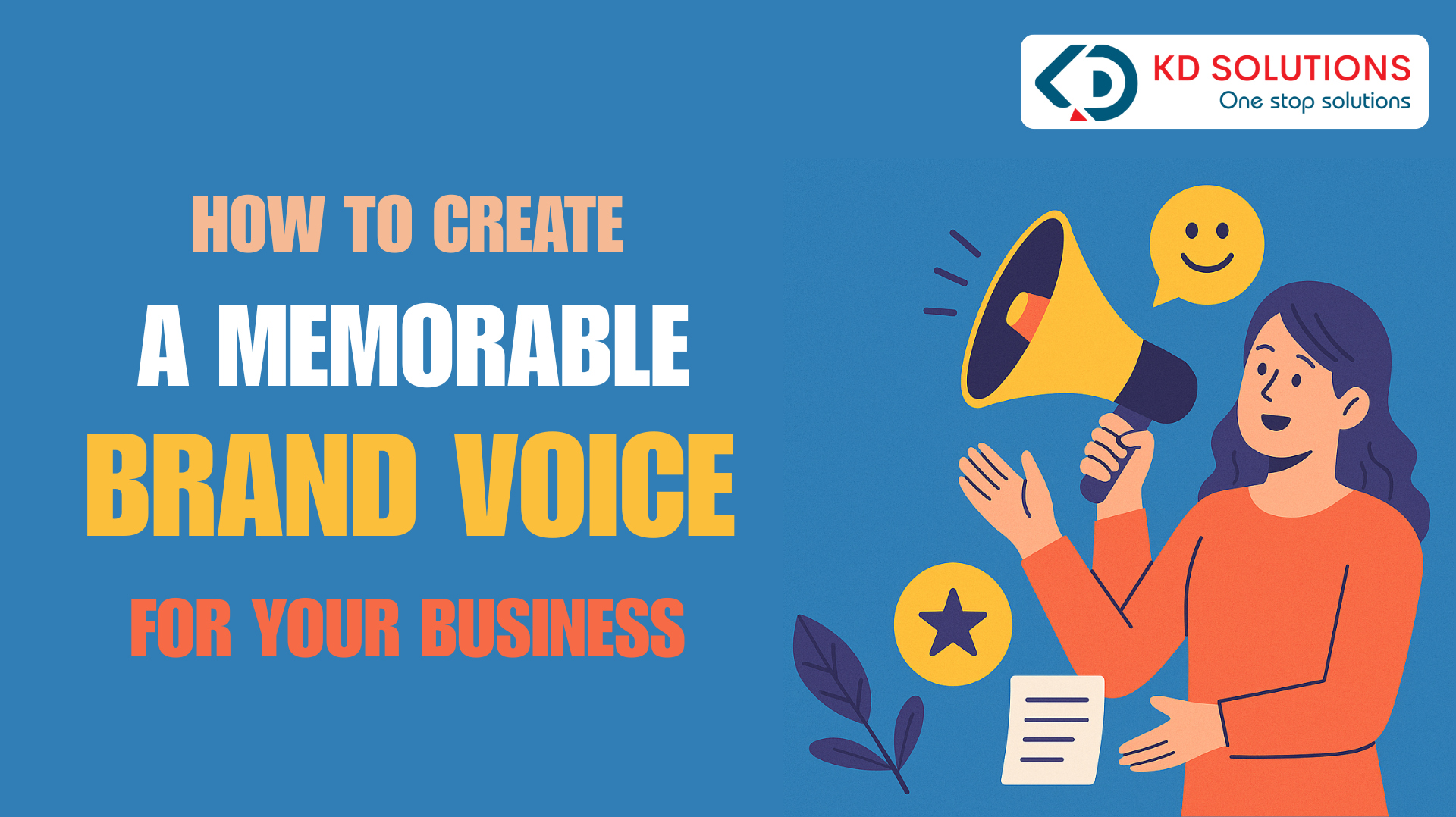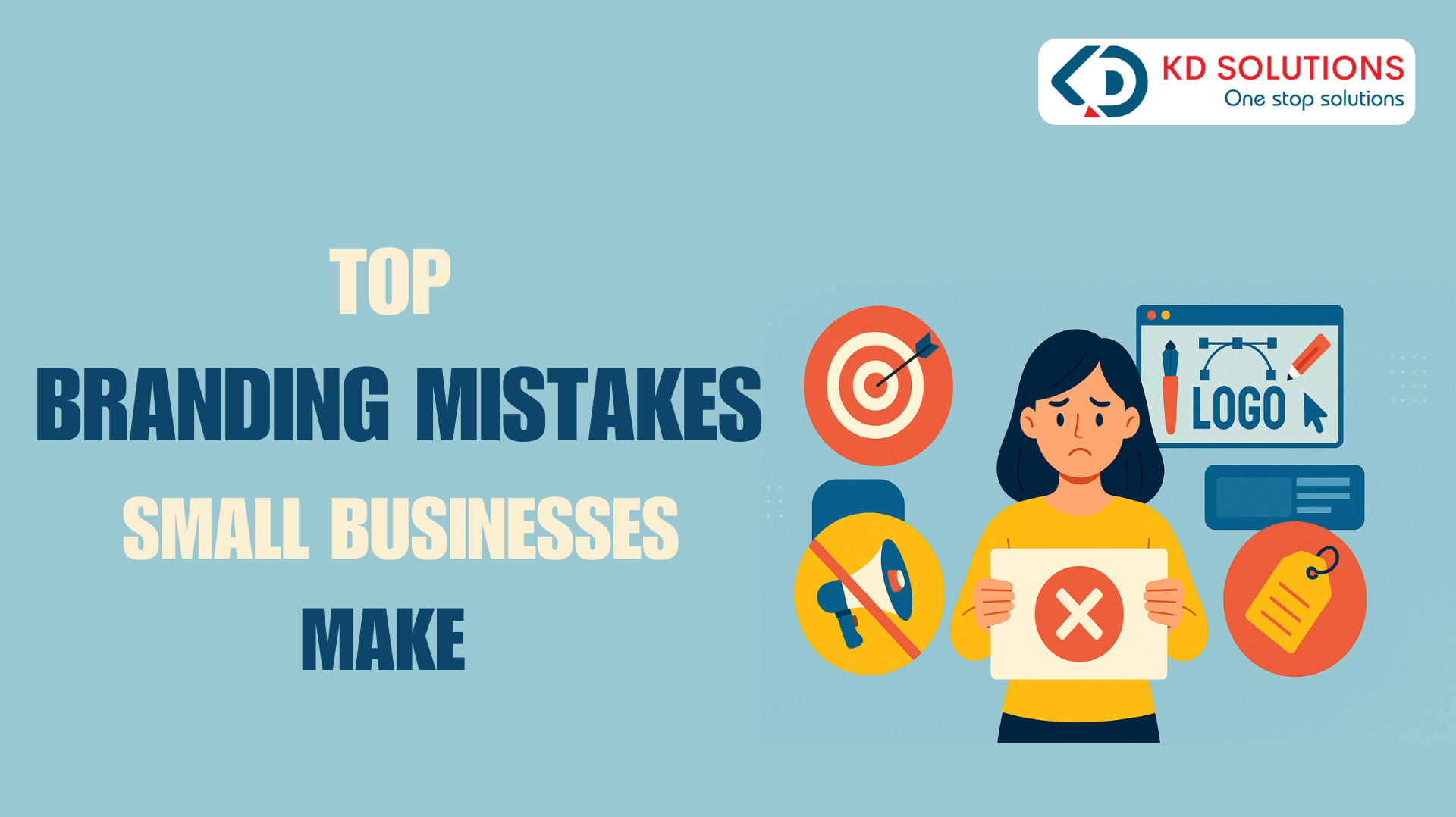In today’s saturated markets, standing out is more than just having a catchy logo or a well-designed website. For B2B companies in competitive niches, branding must go deeper—it needs to shape perception, build credibility, and create emotional connections with decision-makers. B2B buyers are more informed than ever, and they do not just buy products—they buy trust, expertise, and value.
If your company operates in a crowded space where everyone offers similar services or products, effective branding can be the game-changer that elevates your business above the rest. This blog explores practical and strategic branding tips to help B2B companies carve a unique identity in highly competitive industries.
Know Your Niche and Define Your Positioning
Before you dive into logos and taglines, take a step back and define who you are as a brand. Positioning is the foundation of B2B branding. You need to understand your unique value proposition—what makes your product or service different from competitors.
This is especially important in B2B niches where offerings can be very similar across players. By conducting competitor research and market analysis, you can identify gaps or underserved areas and tailor your branding to highlight how you fill those gaps.
Positioning statements like “the most reliable logistics provider for small e-commerce businesses” or “AI-powered compliance for the finance industry” give your brand a strong, memorable focus.
Develop a Strong Brand Identity Beyond a Logo
Brand identity is more than visual aesthetics—it’s how your company looks, sounds, and feels across every touchpoint. For B2B companies, consistency in brand identity can enhance recognition and trust.
Start with a cohesive visual language: a professional logo, brand colors, typography, and design elements that reflect your industry tone—be it innovative, conservative, or cutting-edge.
Then, extend that identity into tone of voice and communication. Are you formal, consultative, or thought-leader-like in your messaging? Your content, emails, website, and sales materials should all speak the same language.
A well-developed brand identity builds familiarity and comfort for B2B buyers who often engage in longer sales cycles.
Create Thought Leadership Content That Solves Real Problems
In B2B branding, content is one of your strongest tools. Thought leadership positions your brand as a go-to expert, not just a service provider.
High-quality, insightful content can demonstrate your industry knowledge and instill confidence in prospects. Focus on solving the real pain points your target audience experiences. Publish whitepapers, case studies, industry reports, blogs, and videos that answer critical questions or explain trends.
This approach does more than attract traffic—it aligns your brand with authority, making clients feel they are working with experts, not just vendors.
Create Thought Leadership Content That Solves Real Problems
In B2B branding, content is one of your strongest tools. Thought leadership positions your brand as a go-to expert, not just a service provider.
High-quality, insightful content can demonstrate your industry knowledge and instill confidence in prospects. Focus on solving the real pain points your target audience experiences. Publish whitepapers, case studies, industry reports, blogs, and videos that answer critical questions or explain trends.
This approach does more than attract traffic—it aligns your brand with authority, making clients feel they are working with experts, not just vendors.
Align Your Sales and Marketing Teams Under One Brand Message
Brand consistency breaks down when your sales and marketing teams aren’t aligned. In B2B sectors where the buying journey involves multiple touchpoints and stakeholders, it’s essential that everyone in your organization speaks the same brand language.
Train your sales teams to understand the core brand values, tone, and positioning so that their messaging reflects what marketing is promoting. Create a brand playbook or toolkit that includes messaging pillars, audience personas, and FAQs to keep everyone on the same page.
This alignment creates a seamless brand experience for the buyer and fosters trust throughout the customer journey.
Humanize Your Brand with Storytelling
B2B doesn’t mean “boring to boring.” Behind every business decision are people. Decision-makers, procurement officers, and managers are influenced by emotion just like B2C consumers.
Storytelling brings emotion into your branding. Share stories of customer successes, your company’s founding journey, or how your team overcame industry challenges. These narratives build emotional engagement, which can be more memorable than features or specs.
Case studies with real client names and metrics are particularly powerful in showcasing credibility and impact in a relatable way.
Leverage Employee Advocacy to Amplify Brand Reach
Employees are often the most underutilized branding asset. When your team genuinely believes in your company’s mission and shares it with their own networks, your brand becomes more authentic and human.
Encourage employees to share company content, industry news, and thought leadership on LinkedIn or professional forums. Highlight their contributions, showcase behind-the-scenes culture, and give them a voice in the brand story.
In B2B branding, where trust is paramount, seeing a company through its people makes a huge impact. It builds credibility and humanizes your brand in a space that often feels corporate and faceless.
Invest in a Professional Website Experience
Your website is often the first real impression your brand makes on a prospect. A poorly designed or slow website can instantly discredit your business in a competitive niche.
Invest in a clean, intuitive, and conversion-optimized website. Focus on user experience—make it easy to navigate, provide clear messaging, and guide visitors toward desired actions like booking a demo or contacting sales.
Incorporate elements like client logos, testimonials, downloadable assets, and easy contact forms. A strong website builds legitimacy, especially when the decision-makers do their own research before reaching out.
Focus on Niche-Specific Branding Rather Than Broad Messaging
One mistake many B2B companies make is trying to appeal to everyone. Broad messaging might attract more attention, but it won’t resonate deeply with the right prospects.
Instead, tailor your branding and messaging to a specific vertical or buyer persona. For example, if you offer software for healthcare compliance, your tone, visuals, and content should reflect the unique challenges of that industry.
Targeting niche segments allows you to craft hyper-relevant branding that positions your company as a specialist rather than a generalist—something that’s extremely valuable in competitive B2B landscapes.
Highlight Customer Success Stories and Case Studies
There’s no better way to prove your brand’s value than by showing real-world impact. Customer success stories, case studies, and video testimonials validate your brand claims with evidence.
B2B buyers often need to justify their purchasing decisions to upper management or other stakeholders. A well-documented case study provides the data and narrative to support that decision.
Highlight metrics such as ROI, time savings, cost reduction, or efficiency improvements. These success stories show that you not only talk the talk but walk the walk.
Build Strategic Brand Partnerships
Strategic alliances with other trusted brands in your industry can elevate your credibility and expand your reach. These partnerships may include co-branded webinars, joint content, co-sponsorships, or integration partnerships.
Choose partners whose values align with yours and who serve a similar audience. These associations add weight to your brand reputation and introduce your services to new qualified leads.
Branding is not just about what you say, but also about the company you keep. Being associated with respected brands boosts your authority.
Monitor Your Brand Perception Regularly
Branding is not a one-and-done task. It evolves with market dynamics, customer expectations, and competition. For B2B companies in competitive niches, monitoring how your brand is perceived is critical.
Use surveys, NPS (Net Promoter Score), online reviews, and social listening tools to gather insights on your brand image. Is your messaging clear? Do people associate your name with quality, innovation, or trust?
Take these insights seriously and refine your branding strategy accordingly. Continuous improvement helps you stay relevant and effective.
Use LinkedIn as a Branding Powerhouse
For B2B companies, LinkedIn is not just a social platform—it’s a brand amplifier. From sharing content to engaging in conversations with industry leaders, your LinkedIn presence can shape how prospects perceive your brand.
Build an active company page, publish regular thought leadership posts, and encourage employee engagement. Run targeted LinkedIn ad campaigns to get in front of key decision-makers in your niche.
The platform’s business-first nature makes it ideal for reinforcing your brand authority and driving meaningful engagement.
Don’t Undervalue the Power of Design in B2B
Design in B2B branding is often overlooked. Many companies assume that function trumps form—but in truth, great design supports function.
Whether it’s a slide deck, sales brochure, trade show booth, or explainer video, high-quality design reflects professionalism and attention to detail. It enhances clarity, keeps the audience engaged, and reinforces your brand identity.
In competitive niches, small design details can help you stand out and be remembered.
Branding Expert for Consistent Growth
In highly competitive niches, having a branding partner who understands your industry, audience, and goals is crucial. This is where KD Solutions excels. As the best branding company in Ahmedabad, India, KD Solutions provides tailored branding strategies that elevate your company in even the most crowded markets. Their team specializes in creating brand identities that not only look good but drive results—whether you’re launching a new brand or repositioning an existing one. If you’re serious about building a powerful brand presence that gets noticed, KD Solutions is your go-to partner.
Final Thoughts
Branding for B2B companies in competitive niches is all about clarity, consistency, and connection. It’s about making your brand not just visible—but valuable. When done right, branding creates trust, sets you apart, and drives sustainable growth.
By defining your positioning, creating authoritative content, humanizing your message, and aligning internal teams, your brand becomes a strategic asset. And with expert help from partners like KD Solutions, you can unlock your brand’s true potential in even the most crowded industries.
Whether you’re a tech startup, manufacturing leader, or B2B service provider—branding is no longer optional. It’s essential. The companies that invest in it today will be the market leaders of tomorrow.
FAQs
Branding is essential for B2B companies because it helps build trust, establish authority, and differentiate your business in a competitive market. A strong brand creates long-term recognition and credibility with decision-makers, especially in industries where buyers rely on reputation and expertise.
B2B branding focuses more on relationship-building, logic-driven decision-making, and showcasing value over time. Unlike B2C, where emotion and impulse drive purchases, B2B buyers require data, trust, and long-term ROI. Branding must reflect industry knowledge, reliability, and professionalism.
Effective B2B branding strategies include:
- Clear market positioning
- Consistent brand identity
- Thought leadership content
- Employee advocacy
- Case studies and success stories
- Strategic partnerships
- Website and LinkedIn optimization
- Alignment between sales and marketing teams
Storytelling humanizes your brand by connecting with real people behind business decisions. Sharing customer success stories, your company journey, or challenges you’ve overcome makes your brand more relatable, memorable, and trustworthy.
Content plays a critical role in demonstrating authority and educating your audience. Whitepapers, blogs, videos, and webinars show you understand industry challenges and can offer solutions. It positions your brand as an expert and builds trust throughout the buyer journey.
To stand out, focus on a niche-specific value proposition. Understand your audience deeply, tailor messaging to their unique challenges, use industry-specific language, and offer real proof of performance through case studies or metrics. Also, ensure your visual and verbal branding is consistent and professional.
B2B companies should review their branding strategy at least once a year or whenever there is a major shift in the market, customer expectations, or business goals. Branding should evolve with your industry and customer needs to remain relevant.
KD Solutions is renowned for providing customized branding solutions that cater specifically to B2B businesses. Their deep understanding of competitive markets, strategic approach to brand positioning, and commitment to driving measurable results make them the top choice for businesses seeking impactful branding in India.
A professional, user-friendly website is crucial as it often forms the first impression. It must clearly communicate your value, guide users through their journey, and reflect your brand identity. An outdated or clunky website can harm credibility and turn away potential clients.
Yes, a strong brand builds trust, which increases the likelihood of inquiries, demo bookings, and sales conversations. When your brand is perceived as reliable and expert, it lowers the friction in the lead generation process and shortens the sales cycle.






